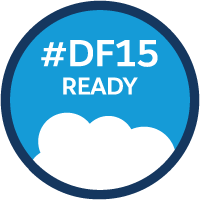Here are some of my current picks for Dreamforce 2015 sessions. They are mostly development focused. There could probably be more Lightning Experience sessions in the mix.
Likely I've made the same mistake as last year and overbooked myself with sessions, of which the list below is only a sampling. There will no doubt be lots of last minute chopping and changing. I'll probably triage based on if I can later catch the sessions recorded content. As Peter Knolle suggests, favoring sessions that occur in Moscone West will keep you mostly around the Developer Zone for technical sessions and save on trying to run from location to location.
Tuesday, September 15
- 10:30 - 11:00 Using Oculus Rift and Virtual Reality to Visualize Data on Salesforce Moscone West, Developer Theater
Because: Oculus Rift! - 11:15 - 11:45 Introducing the Welkin Suite IDE for Salesforce Moscone West, Developer Theater
Meet The Welkin Suite IDE: Product Overview
Because: Visual Studio Code
A Salesforce IDE based on Visual Studio Code. - 11:30 - 12:10 Dynamic Apex Binding Moscone West, 2007
- 1:30 - 2:00 Apex Enterprise Patterns: Building Strong Foundations Moscone West, Innovation Theater
- 2:45 - 4:45 Write/Speak/Code: Speaking Workshop for Developers Moscone West, 2022
- 3:00 - 3:30 Five Enterprise Development Best Practices That EVERY Salesforce Org Can Use Moscone West, Inspiration Theater
- 4:00 - 5:00 Parker Harris's True to the Core: What's Next for Our Core Products Moscone West, Developer Theater
Because: Parker Harris
Wednesday, September 16
- 9:00 - 9:50 Apex Testing Tips and Tricks Moscone West, Community Campfire A
Because: I'm presenting. - 10:45 - 11:15 Creating a Connected Foosball Table with Arduino, Raspberry Pi, and Salesforce Moscone West, Developer Theater
Because: Foosball! - 1:00 - 3:00 Get Ready for a New Kind of Customer Success with Marc Benioff & Special Guests Moscone South, Main Keynote Room
Because: Spectacle
It does take a better portion of a day to watch the main keynote, but it is also a fun spectacle to see in person. Last year The Beach Boys were there and a quad copter made a delivery to the stage. - 4:30 - 5:10 Beyond Custom Metadata Types Moscone West, 2011
- 5:00 - 6:00 Fireside Chat with Satya Nadella and Jessi Hempel Moscone South, Main Keynote Room, Halls ABC
Because: Satya Nadella!
I couldn't pass up an opportunity to see Microsoft's CEO in person. - 4:30 - 6:30 DevTalks DF15: FinancialForce Open Source
Not actually part of Dreamforce, and sadly on at the same time as the Satya chat session, but an interesting collection of short talks.
Thursday, September 17
- 9:00 - 9:50 Meet the Moderators - Getting to Know Salesforce StackExchange Moscone West, Community Campfire A
- 10:30 - 11:20 Salesforce Developer Keynote Moscone West, 3rd Floor
Because: Developers!
Probably more focused to my specific interests. I often wonder why this isn't towards the start of the conference to give an overview of the types of session I should be attending. - 12:00 - 12:40 Defensive Apex Programming Moscone West, 2006
Because: Deployments! - 12:45 - 2:45 Write/Speak/Code: Writing Workshop for Developers Moscone West, 2022
- 3:45 - 4:15 The Apex Interactive Debugger Moscone West, Developer Theater
- 5:00 - 5:40 Introduction To Apex Asynchronous Callout Framework, aka, Continuation Moscone West, 2010
Friday, September 18
- 12:30 PM Meet the Developers
Because: Questions! As I've mentioned before, this is a great session to ask any burning questions of Salesforce developers. - 2:00 - 3:00 Marc Benioff & Parker Harris Q&A
Because: That's a wrap Depending on the timing for getting to the airport for my flight home, it could be a fun way to end the conference.
Discover the World of Connected Products in the #DF15 #DevZone #IoT Area! http://t.co/8khONxZQlJ
— Pat Patterson (@metadaddy) August 31, 2015



